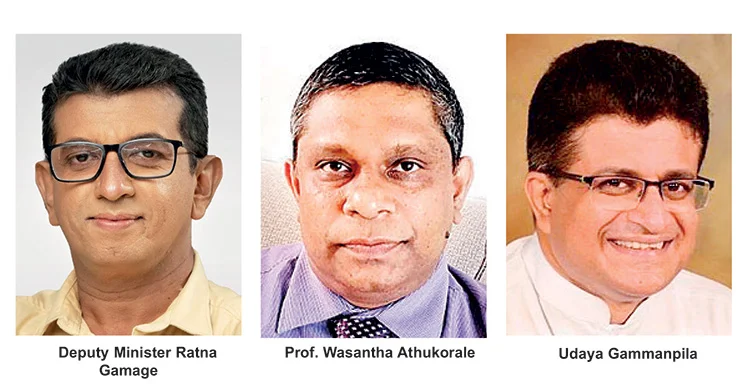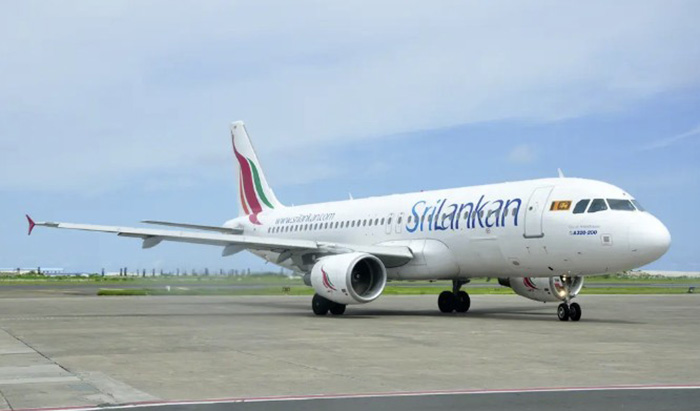Business
Budget 2025: A spectrum of reactions and perspectives

By Sanath Nanayakkare
The 2025 Government Budget has begun to attract multiple comments from the corporate sector, academics, the government ranks and the Opposition. Reproduced below are a few of them.
First Capital Research’s analysts pointed out that the budget heavily leant towards social welfare and infrastructure development significantly increasing government expenditure.
“The already announced tax revenue measures and the digitalization drive are expected to boost Government Revenue allowing the Budget Deficit to be contained at 6.7% of GDP. A significant portion of increased government spending has been directed towards social spending with increased public sector salaries and pensions, coupled with higher allocation for assistance programs such as Aswesuma and other additional social benefits. While this ensures financial relief for many households, it also influences overall economic behavior in ways that will be felt across society. Efforts have also been made to support the lagging economy via public investments with spending targeted towards road construction, water projects, housing and city developments,” First Capital said.
“Despite the extravagant spending increases, a substantial increase in revenue is also planned with bulk of the revenue increase expected from taxes on vehicles while VAT on digital services, the imposition of corporate income tax on the export of services, and an increase in the corporate tax on cigarettes/liquor, and gaming is expected support to achieve the target. Further support is anticipated via digitalization and the expansion in the economy where the Government expects to provide a boost through spending on infrastructure, with the aim to balance spending with fiscal discipline while fostering long-term economic stability,” First Capital noted.
Government
“The Opposition was helpless when the President presented a progressive budget that brings good times for the people of this country. It was the most successful budget when looking back at the budgets presented in the past few decades,” Deputy Minister of Fisheries Ratna Gamage said.
“The government has delivered the best salary increments for state employees. The basic salaries of all state employees have increased across the board in significant amounts. Deputy Minister of Labour, Mahinda Jayasinghe said.
Academics
“Sri Lanka needs new technology-driven production economy. For that the contribution of the private sector is needed. The budget has not focused on that aspect,” Economist Professor Wasantha Athukorale said.
“There is some risk emanating from the increase of state employee salaries which will cost Rs. 300 billion within the next three years. This is more than what is collected from PAYEE tax. Dhananath Fernando of Advocata said.
Opposition
“The Budget represented the voice of the IMF, the sovereign bondholders and the scam-laden super-rich,” Peratugami Activist Pubudu Jayagoda said.
“The Budget presented by President Anura Kumara Dissanayake was the mother of all deceptions”, SLPP General Secretary Sagara Kariyawasam said.
“When state employees get their salary in April, they will realize that they have been taken for a ride by the government, SJB MP Marikkar said.
Janasetha Peramuna leader Ven. Baththaramulle Seelarathan said the government which came to power through the massive support of Buddhist monks., has not made an allocation in the budget for enhancing the quality of education at Pirivenas although other areas of education had allocations.”
Udaya Gammanpila , Leader, Pivithuru Hela Urumaya said that they have identified 12 projects that no allocations were set apart for, through the budget.
Referring to a popular verse about wearing someone else’s pants and strutting about, Gammanpila said,” “The essence of the Budget reveals that the President is confidently adopting Ranil Wickremesinghe’s policies as if they were his own.
Business
SriLankan Airlines Update on Middle East Operations

03 March 2026; Colombo – As airspace in certain parts of the Middle East continues to remain closed due to the ongoing conflict, the following SriLankan Airlines flights scheduled to operate today have been cancelled:
Flight Route
UL 225 Colombo–Dubai
UL 226 Dubai–Colombo
UL 231 Colombo–Dubai
UL 232 Dubai–Colombo
UL 229 Colombo–Kuwait
UL 230 Kuwait–Colombo
UL 217 Colombo–Doha
UL 218 Doha–Colombo
UL 253 Colombo–Dammam
UL 254 Dammam–Colombo
UL 265 Colombo–Riyadh
UL 266 Riyadh–Colombo
We sincerely appreciate our passengers’ understanding and patience as these cancellations are implemented in the interest of their safety and wellbeing.
For more information, please contact: 1979 (within Sri Lanka); +94 11 777 1979 (international); WhatsApp +94 74 444 1979 (chat only); your travel agent; or visit www.srilankan.com
Business
Middle East escalation sends oil soaring; Sri Lanka faces price shock despite assurances on supply

Global oil prices surged sharply yesterday following coordinated US and Israel-backed strikes on Iran, and Tehran’s retaliatory attacks targeting US interests in the region, alongside escalating hostilities involving Hezbollah in Lebanon. The renewed instability in the Middle East – the artery of the world’s energy supply – has sent tremors through financial markets and triggered fresh anxiety in oil-importing nations such as Sri Lanka.
Brent crude climbed steeply in early Asian trading, with traders pricing in the risk of supply disruptions through critical maritime chokepoints, particularly the Strait of Hormuz, through which nearly a fifth of global oil passes. Market analysts say the spike reflects not only immediate supply fears but also the potential for prolonged geopolitical tension that could keep prices elevated for months.
Meanwhile, Asian equities reacted nervously to the unfolding crisis. Major indices across the region retreated as investors fled risk assets, concerned that higher energy costs could dampen growth and reignite inflationary pressures.
Asian oil and gas stocks – the only winner in Asian equity markets – rallied strongly, reflecting expectations of higher revenues amid rising crude prices. This divergence of falling broader markets alongside rising oil shares signals investor anticipation of higher inflation and weaker consumer demand in emerging markets like Sri Lanka.
Meanwhile, reports of increased Chinese crude purchases are further compounding market anxiety. If Beijing accelerates buying to secure strategic reserves in anticipation of supply constraints, global prices could climb even further because China’s procurement strategy has great influence on the world oil price.
“Should Chinese demand rise while Middle Eastern exports face disruption, the supply-demand imbalance could tighten considerably, amplifying volatility in global energy markets”, say global energy market analysts.
In Sri Lanka, long queues have begun forming at fuel stations amid fears of shortages and higher pump prices once new shipments arrive. The government has sought to calm public nerves, stating that sufficient stocks are available for approximately one month and that fresh supplies are being sourced from India and Singapore.
Deputy Minister of Tourism, Dr. Ruwan Ranasinghe said that as Sri Lanka imports refined products primarily from India and trading hubs such as Singapore, direct disruptions to Middle Eastern sea routes would not immediately interrupt supply chains. He maintained that there is no cause for panic buying.
In an unusual show of political maturity, Prasad Siriwardena, an Opposition MP from the Samagi Jana Balawegaya (SJB) urged the public to remain calm and refrain from hoarding, warning that artificial shortages could emerge if panic-driven stockpiling spreads.
However, former minister Wimal Weerawansa criticised the government for failing to build a strategic reserve of at least three months, arguing that Sri Lanka’s total dependence on imported fuel leaves it dangerously exposed to prolonged geopolitical shocks.
Weerawansa contended that the government failed to anticipate the likelihood of US-Iran tensions escalating into direct confrontation and should have proactively guided petroleum authorities to secure adequate reserves in advance.
Meanwhile, an independent analyst told this reporter on the condition of anonymity that the global economic spillover could have wide-ranging consequences on Sri Lanka, outlining five factors.
Energy costs that feed into transportation, manufacturing and food prices
Tighter monetary policy risks as the Central Bank may hesitate to cut rates if inflation resurges
Slower growth as consumers and businesses reduce spending when energy costs rise
A widening trade deficit as Sri Lanka would face increased import bills
Pressure on the Rupee as increased dollar outflows for fuel imports could strain foreign exchange reserves
In conclusion, he said, “One can only hope that diplomacy prevails before oil’s surge turns into a sustained economic storm for the global economy.”
by Sanath Nanayakkare
Business
How ‘distant wars can quickly arrive at the domestic pump’

The harsh economic realities behind soothing words
Sri Lanka’s fragile economic recovery faces a renewed external threat as escalating conflict involving Iran sends global oil prices sharply higher, raising concerns over inflation, foreign reserves and fiscal stability.
While authorities insist there is no immediate fuel shortage, economists warn that prolonged instability in the Middle East could trigger a familiar and painful chain reaction in an import-dependent economy still recovering from its worst financial crisis in decades.
The state-run Ceylon Petroleum Corporation (CPC) confirmed that the country currently holds sufficient petrol and diesel stocks for more than a month.
Energy Minister Eng. Kumara Jayakody assured that scheduled shipments remain unaffected and urged the public to refrain from panic buying, warning that artificial demand could disrupt smooth distribution.
But behind those reassurances lies a harsher economic reality: Sri Lanka does not need a physical fuel shortage to suffer — a sustained spike in global crude prices alone could be enough.
Market jitters intensified amid fears that any escalation could threaten shipping through the Strait of Hormuz, the narrow maritime corridor through which a significant share of the world’s oil supply passes daily. Even speculation of disruption has historically been sufficient to push prices sharply upward.
Sri Lanka sources refined fuel from multiple markets, including India and Southeast Asia. However, global benchmark prices ultimately determine import costs. If crude prices remain elevated, the country’s monthly fuel import bill could surge — placing fresh strain on dollar reserves.
Higher oil prices would ripple across the entire economy. Transport, electricity generation, manufacturing, agriculture and food distribution are all energy-sensitive sectors. A sustained price increase could reverse recent gains in inflation control.
The Central Bank of Sri Lanka has worked to stabilise inflation and the rupee through tight monetary discipline. Analysts caution that a renewed oil shock could complicate this effort, widening the trade deficit and pressuring the exchange rate.
“Sri Lanka is structurally vulnerable to energy price shocks. Even without direct supply disruption, higher global prices immediately translate into macroeconomic stress, a senior economic analyst said.
The government is currently operating under strict fiscal consolidation targets as part of its recovery programme. A rising fuel bill could expand subsidy pressures or force politically sensitive fuel price adjustments.
Any increase in administered fuel prices would inevitably feed into cost-of-living pressures, testing public tolerance amid ongoing austerity.
Beyond oil markets, instability in the Middle East carries another risk: remittances. The Gulf region remains a key source of foreign employment for Sri Lankans and a crucial inflow of foreign exchange.
Any economic slowdown or labour disruption in the region could dampen remittance flows, reducing one of the country’s most stable dollar lifelines.
An energy expert said for Sri Lanka, the Iran conflict is not merely a distant geopolitical event. It is a potential economic stress test at a moment when stability remains hard-won.
“Whether this turns into a temporary price spike or a prolonged oil shock will determine how severely it tests the country’s recovery trajectory. For now, policymakers are watching global markets closely — aware that in today’s interconnected economy, distant wars can quickly arrive at the domestic pump.”
By Ifham Nizam
-

 Opinion5 days ago
Opinion5 days agoJamming and re-setting the world: What is the role of Donald Trump?
-

 Features5 days ago
Features5 days agoAn innocent bystander or a passive onlooker?
-

 Features6 days ago
Features6 days agoRatmalana Airport: The Truth, The Whole Truth, And Nothing But The Truth
-

 Features2 days ago
Features2 days agoBrilliant Navy officer no more
-

 Business7 days ago
Business7 days agoDialog partners with Xiaomi to introduce Redmi Note 15 5G Series in Sri Lanka
-

 Features7 days ago
Features7 days agoBuilding on Sand: The Indian market trap
-

 Opinion7 days ago
Opinion7 days agoFuture must be won
-

 Opinion2 days ago
Opinion2 days agoSri Lanka – world’s worst facilities for cricket fans












